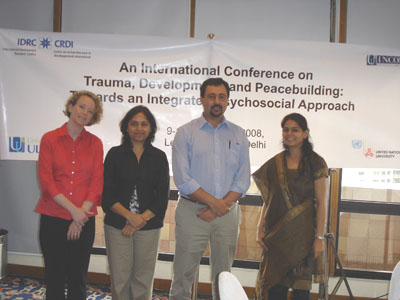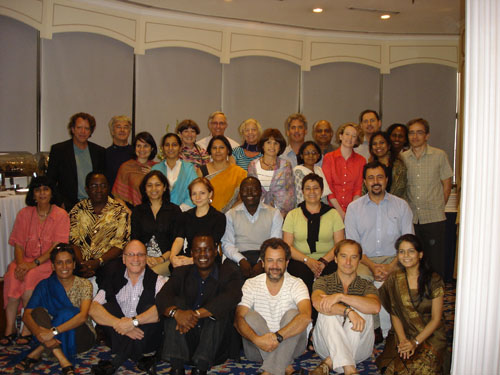Introduction
In late 2007
INCORE began an exciting new project funded by the International
Development Research Centre (IDRC) of Canada focussed on trauma,
development and peacebuilding. In September 2008, the project
brought together practitioners and theoreticians from around
the world working with what can broadly be called psychosocial
interventions, or collective attempts to deal with trauma following
political conflict, at a roundtable conference in Delhi, India. In
doing so, the project sought to find new ways to conceptualise
trauma within the development and peacebuilding context so as to
maximise its utility as a practical concept. The outputs from the
project were six theoretical/regional overviews from various experts
in the psychosocial field; a conference report; and a database
which provides the beginnings of a global scan of various psychosocial
programmes that attempt to deal with the impact of violent political
conflict. The project was coordinated by Dr. Brandon Hamber, Director
of INCORE and he was assisted by Dr. Mary Alice C. Clancy

Dr Mary Alice Clancy (INCORE), Dr Navsharan Singh (IDRC),
Dr Brandon Hamber (INCORE), Jyoti Malik (IDRC), Delhi, India, September
2008
Background
Over the last decade an emerging field has begun to develop that
questions the development and conceptualisation of Post-Traumatic
Stress Disorder arguing that it is a socially created phenomenon
with social, political and economic ends. Others also question
the role and value of dominant medicalised approaches to dealing
with trauma in conflict zones. One alternative way to think about
trauma following political violence is within a so-called psychosocial
framework.
The psychosocial
framework stresses the importance of thinking about political trauma
from both the psychological and social perspectives. The
term psychosocial, according to Inger Agger, “attempts to
express the recognition that there is always a close, ongoing circular
interaction between an individual’s psychological state and
his or her social environment”. In essence, the psychosocial
approach demands that we think about how social conditions relate
to mental health. In terms of political violence this means
we have to think about the social context of violence and not only
its individual consequences, as well as how the social and political
context influences individuals. Such an approach would have
a direct synergy with development and peacebuilding work.
There
are areas where this is beginning to happen. Some work has been done
to produce a Conceptual Framework which maps the field of psychosocial
intervention in complex emergencies, e.g. the work of the Psychosocial
Working Group and projects around the globe have tried
to develop psychosocial interventions that seriously take context
into account. Psychosocial-based training manuals for aid workers
have also been developed.
That said,
although individuals and some research groups have begun to question
how the trauma concept is being used in the peacebuilding and
development field, and psychosocial interventions are progressing,
a core text or a consolidation of theory and best practice built
on these so-called alternative perspectives on trauma and the industry
that surrounds it is not available. In short, a significant
challenge to dominant more medicalised approach to dealing with
trauma is not available, as well as a consolidated approach to
trauma that moves beyond the individual and also starts to recognise
the collective dimensions of trauma.
Project Outline – Summary
Project Outline – Full
Activities
The first phase of the project brought together a 22 experts working
on psychosocial approaches to trauma, peacebuilding and development
from around the world at a roundtable conference which was held
in Delhi, India from 9-11 September 2008. Through the presentation
of theoretical and regional overviews, and individual case studies,
the roundtable sought to analyse, critique, and disaggregate different
approaches to trauma globally considering its impact on peacebuilding
and development processes in societies coming out of conflict.

Conference Participants in Delhi, India, September 2008
Outputs
Database
In addition
to the conference and its associated outputs, a database (environmental
scan) of organisations working in the area of psychosocial work
and working directly with what could be termed collective interventions
to deal with trauma was produced. This is a
work in progress and suggestions are welcome.

Searchable
database of Psychosocial Projects
Future plans
The project
was envisaged as a first step to a larger initiative. Based
on feedback from the Delhi Conference in September 2009 a new proposal
for a larger project is now underway. It is envisioned that the
next stage of the project will commence in March 2009.
Contact Information
Project co-ordinator Dr
Brandon Hamber
Research associate Dr
Mary Alice Clancy
For more information contact b.hamber@ulster.ac.uk

